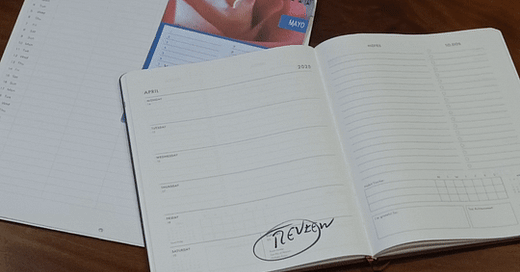Sometimes a poem is more of a feeling than a thought.
The words on the page make sense in and of themselves, but they blur to leave you with a sensation. In These Days, Leontia Flynn writes to make you feel, and succeeds.
Like Patience Agbabi, I first came across Flynn at A Level when we were asked to read one of the ultimate “goodbye” poems, ‘The Furthest Distances I’ve travelled’. Like all the best poems, it tells a human truth, and the quirky form — including occasional rhymes and half-rhymes, which are employed throughout the collection — makes it especially memorable. I always laugh at ‘alien pants’ and enjoy the soundplay of ‘Krakow / and Zagreb’ every time I read it; poems like these become nostalgic, homely, a reliable groove to trace through.
Flynn’s poetry is a little hard to describe but, basically, if you look at this headshot — I only wish mine was this good — you’ll understand the attitude she brings to the page. It’s not wry, cynical or wistful, per se. Instead, it’s knowing. Take 'For Stuart, who accidentally obtained a job in the Civil Service': a perfectly hilarious title. It employs words like ‘truculent’ and ‘condolences’ as well as an unstressed final syllable to show the comical and slightly sad reality of getting a “real job”. This is classic Flynn; she proves that any life story can be interesting if you tell it right.
But not all of the poems are as straightforward as the two above. Most are like a good film, which is to say that you often get more out of it the second time around. Titles like ‘On the third floor of the royal infirmary’ and ‘Festival Times’ do a lot of heavy lifting to provide context for the stitched-together images. As well as this, a lot of the poems run to just 10 lines: shorter than sonnets, they seem like windows into life. Half-remembered moments or, perhaps, half-understood ones. This is only furthered by the aforementioned half-rhymes, and if you read aloud (as I almost always do) it feels like you’ve finished reciting a spell by the end of each poem; that you’ve spoken in a language that you only just understand; that by collecting these syllables together, you’ve tried to make something real appear.
The following opinion isn’t original but, as many writers know, this is the real trouble of language: that we can describe a tree, but we cannot actually “tree”, if such a verb exists.1 In this way, I think that Flynn’s writing pushes its shoulder up against what language can achieve and, in an act of immense cleverness, I think that the poet tries to take herself out of the poem to get at what’s really there more accurately. For instance, though the sequence of 5 poems titled ‘Without Me’ is ostensibly about the breakdown of a relationship, I think that they can be read metapoetically to question how a poem could exist without an author. Impossible, of course, but something we could strive towards in an effort to reveal more clearly the reality we’re trying to describe, without our pesky Ego getting involved. In one of the ‘Without Me’ poems, she goads, ‘So, Sylvia, go on, snap the magic thread / between feeling – feeling everything, feeling nothing.’ This is the tightrope act of writing: will the words affect the reader? What new combination of words could possibly achieve this? And what will prevent the words from just sitting there on the page, dumb as a lampost in the daylight?
I mean, who knows, right? That’s the game: the push and pull, the tug of war, the compromise between self-expression and universal resonance. It’s a game that Flynn plays well, whether she’s making fun of herself in ‘When I was sixteen I met Seamus Heaney’ or condensing the enormous feelings that one has to metabolise in recognition of the persistent march of time — into fifteen lines! — in the eponymous poem ‘These Days’. I get the sense that she’s enjoying herself, the exploration of what she and her magic words can do, and as a reader I’m able to enjoy it right alongside her.
I guess I feel something similar when I write. It’s always an attempt to tell you something. Something true.
Do I try? Yes.
Do I fail? Inevitably.
Is it worth it? Well, duh.
All love,
Baz 🧡💙
See, this is exactly what I’m talking about!





